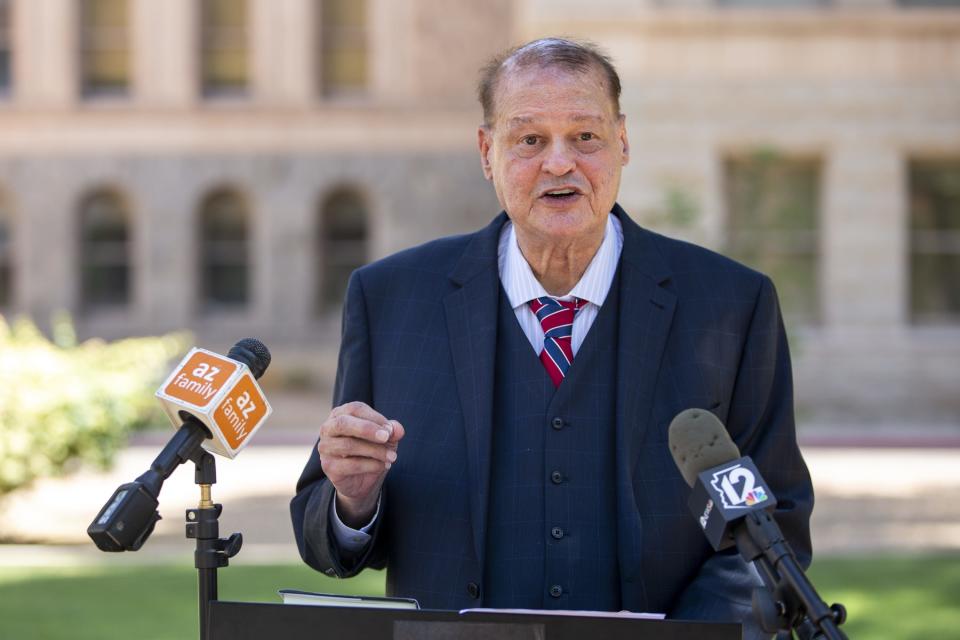What is critical race theory? Is it being taught in Arizona schools?
Earlier this year, Superintendent of Public Instruction Tom Horne started a hotline for members of the public to report “inappropriate lessons." His definition of that includes the use of critical race theory, which is often called CRT.
Arizona educators have said they are not teaching the advanced concept, primarily reserved for graduate school programs. Horne's claims that critical race theory is being taught in the K-12 setting, teachers argue, is an effort to increase mistrust of public schools.
Conservatives like Horne have latched on to the academic framework as a political issue, causing it to rise in prominence in conversations about public education in Arizona and the U.S. But what is critical race theory, and is it being taught in schools?

What is critical race theory?
Critical race theory is an academic concept examining how U.S. institutions impact racial groups differently. Some conservatives have used the phrase "critical race theory" to label any race-related instruction that touches on racial oppression.
Critical race theory was first developed in the 1970s and 1980s by legal scholars looking to understand why racial disparities in legal outcomes continued despite the gains of the Civil Rights Movement.
According to the Encyclopedia Britannica, critical race theory relies on two main ideas: that race is a culturally invented category used to oppress people and that law and legal institutions are racist when they maintain inequalities between white and non-white people.
The introduction to a 1995 book, “Critical Race Theory: Key Writings that Formed the Movement,” describes the work of critical race theorists as challenging how "race and racial power are constructed and represented in American legal culture and, more generally, in American society as a whole.”
In short, critical race theory focuses on the racially biased effects of institutions, not the racism of individuals.

"CRT does not attribute racism to white people as individuals or even to entire groups of people. Simply put, critical race theory states that U.S. social institutions (e.g., the criminal justice system, education system, labor market, housing market, and healthcare system) are laced with racism embedded in laws, regulations, rules, and procedures that lead to differential outcomes by race," according to Rashawn Ray, a sociology professor at the University of Maryland and senior fellow at The Brookings Institution, and Brookings researcher Alexandra Gibbons.
"Sociologists and other scholars have long noted that racism can exist without racists. However, many Americans are not able to separate their individual identity as an American from the social institutions that govern us — these people perceive themselves as the system. Consequently, they interpret calling social institutions racist as calling them racist personally. It speaks to how normative racial ideology is to American identity that some people just cannot separate the two," Ray and Gibbons wrote.
Is critical race theory taught in Arizona public schools?
Many educators have said that critical race theory is not taught in K-12 schools in Arizona. In addition, critical race theory is not part of the standards or teaching frameworks approved by the Arizona State Board of Education for use in district or charter schools.
But Horne said his administration, which takes an expansive view of what constitutes critical race theory, has received reports from classroom teachers of the theory's use.
Any mention of certain terms — for instance, "whiteness," "oppressor" or "oppressed" — is proof of critical race theory instruction, according to the Arizona Department of Education's website.
The use of social and emotional learning — a teaching framework to help young people regulate their emotions, establish and maintain relationships, and show empathy for others — is also an indicator of critical race theory's use, according to the Horne administration.
How can I learn more about my child's curriculum?
School districts often tell parents what students are learning through online portals, parent-teacher conferences and governing board meetings.
If families are concerned about what their students are learning, they should contact the child’s teacher, said Arizona Education Association President Marisol Garcia.
“Parents have the ability to email teachers, call them, show up at the office, have conversations,” she said. “We have these relationships.”
Families in Arizona can also file complaints about specific educators with the Arizona State Board of Education, raise concerns to school leaders, or speak publicly at governing board meetings.
Yana Kunichoff is a reporter on The Arizona Republic's K-12 education team. You can join The Republic's Facebook page and reach Yana at ykunichoff@arizonarepublic.com.
This article originally appeared on Arizona Republic: What is critical race theory and is it in Arizona schools?
